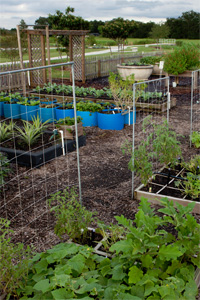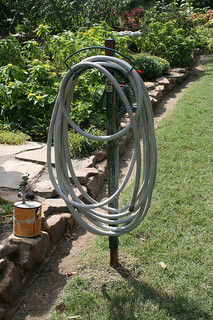Theresa Badurek, Urban Horticulture Agent, UF/IFAS Extension

Are you growing a spring vegetable garden- or thinking about taking the plunge? Let’s take a look at the tools you need to help maintain a successful organic garden. The intention here is not to achieve organic certification, but to grow healthy food for ourselves and our families and use healthy practices for our planet. If you are starting a new garden or going organic for the first time, you should understand that it may take time to build a healthy garden. A rich, healthy soil must be built and you must hone your practices to watch for pests and diseases. This is critical for any kind of gardening endeavor. April is late to get started for many vegetables, but there are some summer crops you can grow such as sweet potatoes, okra, eggplant, peppers, and watermelons for example. You can also grow cover crops like black-eyed peas.

Soil Preparation is Key
Organic matter and any organic fertilizers should be worked into your soil at least three weeks ahead of planting. If you are using compost and mulches be sure that there are no large clumps of unrotted organic material. These can harbor disease problems as well as hinder seedlings or their growth. When your conditions are right, these organic materials will be processed by microorganisms like fungi, algae, bacteria, molds, and earthworms. As they do this they make important nutrients available to your plants. This is one reason why it is important to NOT use pesticides in your garden. Pesticides destroy these critical organisms that work so hard for your garden. Even organic pesticides can cause harm to beneficial insects and should only be used as a last resort and in a very targeted and controlled manner. For detailed information on various soil amendments, please refer to the publication link at the end of this article.
Seeds and Transplants
While it may seem obvious to buy organic seeds and starts, or transplants, there is much more to your plant material than that if you want a successful organic garden. The most important thing you can do is select the right crops and varieties for our area and plant them at the right time. We are often tempted to plant crops or varieties that we know and love from some other geographic location, but these are often not suited to our unique subtropical climate. How do you know what and when to plant? Utilize the following publication, Florida Vegetable Gardening Guide. Use this to plan your garden layout and bring it with you when shopping for seeds and plants. Pay special attention to Table 4, “Suggested Varieties for Florida Gardens” and Table 3 “Planting Guide for Florida Vegetables”.

Watering
A good organic soil will be full of organic materials that help the soil retain water, as will good garden mulch. There is more you can do to use water wisely in an organic garden, though. To begin, a good soaking once a week throughout the root zone will be necessary unless there is sufficient rainfall. Drip or trickle irrigation will help you conserve water while avoiding wetting the leaves. Wet leaves can encourage disease, and disease prevention is an important tool in the organic gardener’s toolbox. If you use overhead irrigation, be sure to water in the early morning hours, not in the evening.
Pests and Diseases
So, how do you keep uninvited guests from eating all of your hard work in the garden? Well, you must have a regular scouting routine for pests. At every step of your gardening venture you should be looking for signs of pests. Hopefully you selected resistant varieties from the Florida Vegetable Gardening Guide publication (see link above) and inspected your plants for pests and diseases before purchase and planting. Learn to recognize the beneficial insects that help control the “bad guys” that cause damage. Not using pesticides will help preserve the “army” of beneficial insects in your garden. A great guide to start learning about beneficial insects is Natural Enemies and Biological Control.
There are even more things you can do to help prevent and control pests and diseases, though. Here is a sampling from the Organic Vegetable Gardening in Florida publication whose link you will find at the end of this article:
- Use mulch; vegetables touching the soil may rot.
- Good garden mulch tends to reduce damage caused by nematodes.
- Keep out weeds which harbor insects and diseases.
- Water in morning so plants are not wet at night.
- Dispose of severely diseased plants before they contaminate others.
- Hand-pick insects.
- For cutworms, place a cardboard or tinfoil collar around plant stems at ground level.
- Clean up crop refuse early.
- Rotate garden areas; don’t grow plants from the same family in the same location season after season.
There is so much to be gained from a beautiful organic garden- fresh healthy produce, a safe environment for the gardener, and a balanced ecosystem that allows nature to do some of the work for you. For more information and tools for your organic garden, please see Organic Vegetable Gardening in Florida.
Happy gardening!
 0
0
